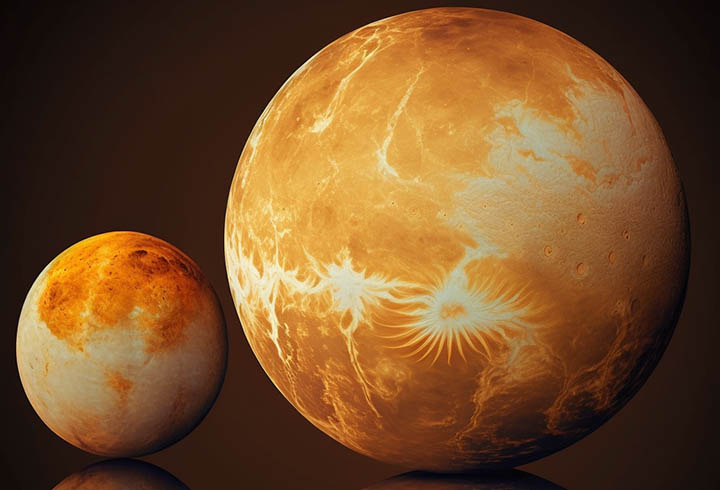Venus and Mercury are the two innermost planets in our Solar System, and they both orbit closer to the Sun than Earth. Despite the fact that Mercury’s orbit is closer to the Sun, Venus is actually even hotter. The list of reasons why Venus is hotter than Mercury includes its atmosphere, greenhouse effect, and surface conditions.
Atmosphere of Venus
The primary reason why Venus is hotter than Mercury is its atmosphere. Venus has a thick, dense atmosphere that is composed mostly of carbon dioxide, with small amounts of nitrogen and other gases. The atmosphere on Venus is much denser than that of Mercury, which means that it can trap more heat from the Sun.
Greenhouse Effect
Another reason why Venus is hotter than Mercury is the greenhouse effect. The atmosphere on Venus acts like a greenhouse, trapping heat and preventing it from escaping back into space. This is due to the high concentration of carbon dioxide in the atmosphere, which absorbs and re-radiates heat energy.

Surface Conditions
The surface conditions on Venus also contribute to its high temperature. Venus has a surface temperature that can reach up to 460 degrees Celsius (860 degrees Fahrenheit), which is hotter than the surface of Mercury. This is due to the thick atmosphere that traps heat, as well as the fact that Venus rotates very slowly. It takes Venus 243 Earth days to complete one rotation on its axis, which means that the same side of the planet is always facing the Sun.
Temperature Records
The surface temperature on Venus that can reach up to 460 degrees Celsius (860 degrees Fahrenheit). That’s so hot that it can melt lead and zinc, and is hot enough to cause severe damage to spacecraft that attempt to land on the planet!

Mercury has a surface temperature that can reach up to 430 degrees Celsius (800 degrees Fahrenheit) during the day. However, due to its lack of atmosphere, the temperature on Mercury can drop dramatically at night, reaching as low as -180 degrees Celsius (-290 degrees Fahrenheit). This extreme temperature difference is due to Mercury’s lack of atmosphere, which means that it cannot retain heat and regulate its temperature in the same way that Venus can.
So Why Venus Is Hotter?
In conclusion, Venus is hotter than Mercury due to its thick atmosphere, greenhouse effect, and slow rotation. The thick atmosphere on Venus traps heat and prevents it from escaping back into space, while the high concentration of carbon dioxide in the atmosphere contributes to the greenhouse effect. Additionally, the slow rotation of Venus means that the same side of the planet is always facing the Sun, which contributes to the high surface temperatures. While both Venus and Mercury are hot planets, the reasons for their respective temperatures are quite different.


